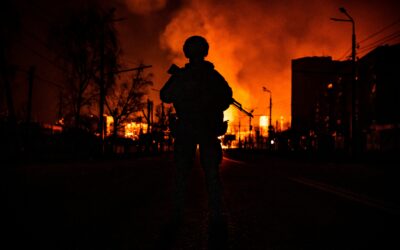
In Future Wars, Drone Weapons With Minds of Their Own
SUBSCRIBER+EXCLUSIVE BRIEFING — Drone weapons are part of the daily narrative of the war in Ukraine – from Russia’s use of Iranian drones against infrastructure […] More
The Panmunjom Declaration gives us hope that denuclearization of the Korean Peninsula is possible. The Summit of South Korean President Moon Jae-in with North Korea’s Kim Jung-un was heavy on atmospherics and compelling with a detailed Declaration that a few months ago would have been viewed as wishful thinking. Yes, there’s reason to be skeptical, given two previous failed summits and two previous agreements – the 1994 Agreed Framework and the September 2005 Joint statement – that crashed after a few years of implementation. But this is 2018, and it’s Kim Jong-un, the young leader who was educated in Switzerland and who knows that the world, and especially South Korea, has prospered economically while North Korea can’t feed its people. What a message: a country that was once the economic model for East Asia is now an economic basket case.
So why is it hard to understand that crushing sanctions and intimidating military exercises had a profound impact on Kim? Why is it hard to understand that this young leader may want to improve the standard of living for his people; may want North Korea to be a legitimate nation state and not a pariah nation isolated from the family of nations? Indeed, it’s Kim who appears to be making the bold, unimaginable decision to give up his nuclear weapons for normal relations with the U.S., with security assurances that North Korea will not be attacked or invaded with conventional or nuclear weapons, language used in the September 2005 Joint Statement that I helped to draft, as the Special Envoy and as U.S. deputy head of delegation to the Six Party Talks for President George W. Bush. In addition to security assurances, North Korea wants an end to the Korean War and the establishment of a permanent peace regime. To do this, China has to be an active participant as we pursue a peace treaty and declaration to end the Korean War. Indeed, it was China that hosted the Six Party Talks in Beijing that resulted in the September 2005 Joint Statement. China has a 1961 Peace and Friendship Treaty with North Korea, its ally, while also remaining supportive of comprehensive denuclearization of the Korean Peninsula. The economic influence China has with North Korea, with conducting over 80% of North Korea’s trade and providing over 90% of North Korea’s crude oil requirements, is immense. And the recent visit of Kim with President Xi Jinping is proof that China is working to improve recent political tension.
Given the successful Korean Summit, the prospects are encouraging that President Donald Trump’s meeting with Kim will go well. There are a number of issues that Trump will have to pursue for clarity, to ensure that Kim agrees that Complete, Verifiable and Irreversible Dismantlement (CVID) is what we mean by denuclearization and that a verification region with international monitors will be required, with strict timelines for dismantlement. These and other issues will be challenges for Trump. But given what we’re witnessing, it’s likely Trump will succeed.
Many will disagree with this assessment. Interestingly, many of these outspoken critics were in government positions previously and opted to ignore North Korea’s race to acquire a more potent nuclear and missile arsenal. And recently when developments became tense on the Korean Peninsula, they were quick to criticize, noting the potential for conflict. Now that peace appears possible, they question the sincerity of Kim and claim that the Trump Administration is naïve. We’ll see, but they would be wise to refrain from being too critical, since their so-called efforts failed, miserably.
The views expressed in this article are not intended to reflect the views of any government agency or department.
Related Articles

SUBSCRIBER+EXCLUSIVE BRIEFING — Drone weapons are part of the daily narrative of the war in Ukraine – from Russia’s use of Iranian drones against infrastructure […] More

SUBSCRIBER+ EXCLUSIVE ANALYSIS — Iran’s retaliatory strikes against Israel this weekend were both a potentially game-changing, historic first — and an underwhelming response. Historic, because […] More

SUBSCRIBER+EXCLUSIVE INTERVIEW — Ukraine was hit by a fresh round of Russian missile attacks on Thursday, strikes that targeted and damaged the country’s power grid […] More

SUBSCRIBER+ EXCLUSIVE REPORTING — The Israeli drone strike that killed three adult sons (who Israel says were Hamas operatives) and four grandchildren of Hamas’s Qatar-based […] More

BOTTOM LINE UP FRONT – In the spring of 2022, Ukraine beat back a Russian assault on the nation’s capital and punished the invaders on […] More

SUBSCRIBER+EXCLUSIVE — The Ukraine war has reached a “pivotal moment,” a “critical stage,” an “inflection point“ – all phrases used to describe the current situation […] More
Search